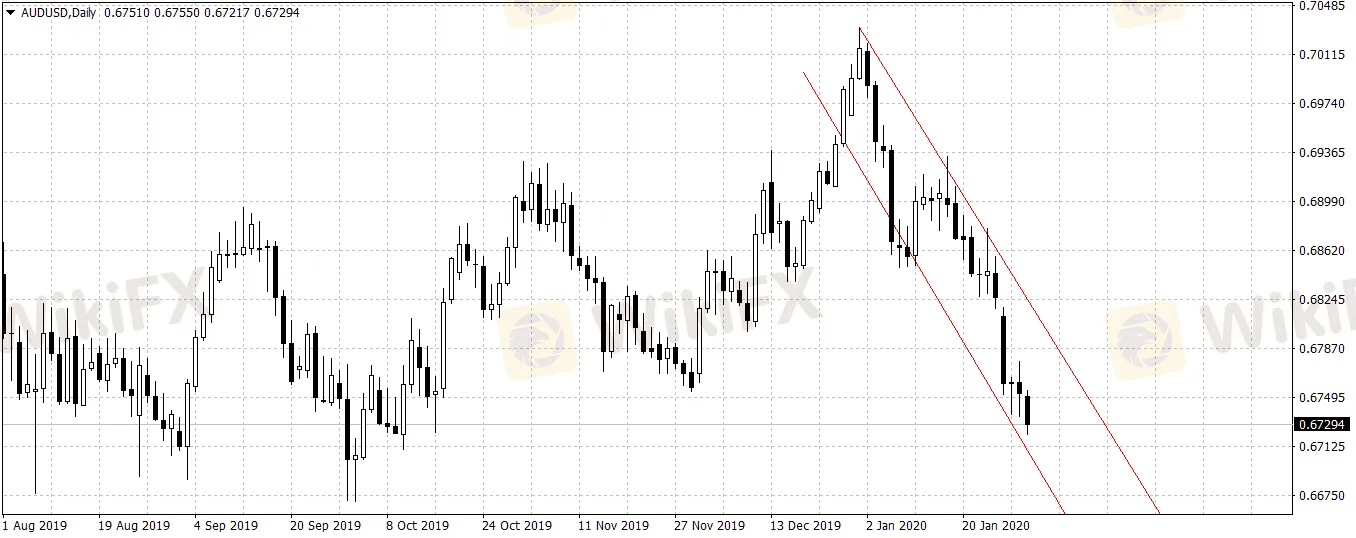AUD’s Trend Is Affected by Macro Economy
摘要:Latest statistics show Australia’s annualized CPI from Q4, 2019 to be 1.8%, lower than the central bank’s 2%-3% long term target range, which the inflation fails to reach ever since 2017.
Latest statistics show Australia‘s annualized CPI from Q4, 2019 to be 1.8%, lower than the central bank’s 2%-3% long term target range, which the inflation fails to reach ever since 2017.
A worrying fact is that, like the core inflation elsewhere around the globe, Australia‘s average inflation excluding items facing price volatility remains at 1.6%, and has been hovering at that level for 5 quarters, which may explain why the Australian dollar’s response to the data was lower than expected.
Moreover, the beginning of 2020 has been an awful start for the overall economy. The raging epidemic of novel coronavirus has been a hard blow on Australian dollar which is linked to economic growth. Amid a wave of risk aversion, the market is worrying about possible impact of the coronavirus epidemic on tourism and economy of the Asia Pacific region.
Global economy remains nearly stagnant in an international context full of uncertainties, while global central banks still lack efficient financial stimulus. Even if the Reserve Bank of Australian decides not to cut interest rate next month, the AUD will be hard to climb against all these adversaries. The daily average chart suggests AUD/USD has fallen to the lowest point since the end of 2019.
AUD/USD daily pivot points: 0.6754---0.6756
S1: 0.6733 R1: 0.6775
S2: 0.6713 R2: 0.6797

免责声明:
本文观点仅代表作者个人观点,不构成本平台的投资建议,本平台不对文章信息准确性、完整性和及时性作出任何保证,亦不对因使用或信赖文章信息引发的任何损失承担责任
相关阅读

英国正式脱欧,欧盟损失多少?
英国于2020年1月31日正式离开欧盟,英欧双方计划随后展开谈判以达成未来关系协定。我们认为,英国“脱欧”将给欧盟带来多重负面冲击。

英镑-从经济数据中寻找线索
2019年年底的英国大选是在经济不景气的背景下举行的。最新数据显示,英国经济增长已陷入停滞,一度强劲的劳动力市场开始乏力。2020年上半年,英镑可能开始从国内经济、英国央行以及最关键的3月份预算中找到方向。此外英国脱欧协商仅处于开始阶段,能否最终达成自由贸易协定也相当关键。

加元-在未来一年上行动能减弱
我们认为加元作为去年表现最好的10国集团(G10)货币,今年将进入横盘整理态势,由于加拿大国内经济趋疲,而且近期贸易紧张情势缓和带来的提振作用减退。加元兑美元2019年上涨5%,其中约有半数涨幅是在年底的最后几周实现的,2019年末的时候各种风险大幅减弱,提振了加元和另外几种货币。

澳元-内外需求皆显疲弱
澳洲经济在2019年显示出显露疲态之势,薪资增长停滞和债务高企令消费者大幅削减支出。尽管去年澳洲联储降息三次至0.75%,但民间消费依然低迷。
天眼交易商
热点资讯
黄金价格预测:持平于 2,600 美元上方,市场等待新的催化剂
澳储行会议纪要前,澳元/美元持稳于 0.6250 附近
赢双倍美金,享double欢乐:圣诞价格大赢家,快来预测外汇和大宗商品涨跌!
欧元/美元价格分析:测试接近1.0450的九日EMA,RSI改善支持上行
尽管加拿大 GDP 好于预期,美元/加元仍重返 1.4400上方
今日汇市:假期前夕,市场交易量清淡
黄金价格预测:黄金/美元在假期交易周前持平于2600美元上方
英镑/美元价格预测:英镑承压,指向1.2500水平
全球加密货币监管变革:美国的推动与马来西亚的数字资产框架
加拿大国内生产总值上升,但加元仍维持在近期低点附近
汇率计算


